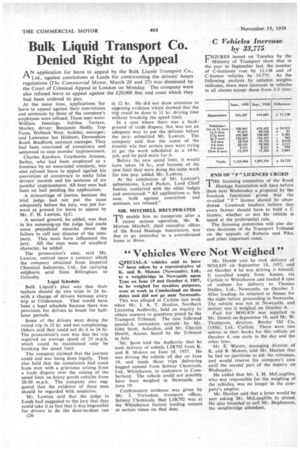Bulk Liquid Transport Co.
Page 76

If you've noticed an error in this article please click here to report it so we can fix it.
Denied Right to Appeal
AN application for leave to appeal by the Bulk Liquid Transport Co., Ltd., against convictions at Leeds for contravening the drivers' hours regulations (The Commercial Motor, March 20 and 27) was dismissed by the Court of Criminal Appeal in London on Monday. The company were also refused leave to appeal against the £20,000 fine and costs which they had been ordered to pay.
At the same time, applications for leave to appeal against their convictions and sentences by three of the company's employees were refused. These men were: William Jennings, Jubilee Terrace, Morley, driver; Benjamin Skelly, Top Farm, Welbeck West, ArdsIey, manager; and Lawrence Ian Hickson, Devonshire Road, Bradford, assistant manager. They had been convicted of conspiracy and sentenced to nine months' imprisonment.
Charles Kershaw, Gaythorne Avenue, Batley, who had been employed as a foreman by an associated company, was also refused leave to appeal against his conviction of conspiracy to make false drivers' records and his sentence of six months' imprisonment. All four men had been on bail pending the application.
A miscarriage of justice, because the trial judge had not put the cases adequately before the jury, was put forward as ground for leave to appeal by Mr. F. H. Lawton, Q.C.
A second ground, he added, was that in his summing-up the judge had made some prejudicial remarks about the failure to call any director of the company. This must have influenced the jury. All the men were of excellent character, he added.
The prosecution's case, said Mr. Lawton, centred upon a contract which the company obtained from Imperial Chemical Industries, Ltd., for carrying sulphuric acid from Billingham to Grimsby.
Legal Schedule Bulk Liquid's plan was that their tankers should do two trips in 24 hr. with a change of drivers between every trip at Gildersome. That would have been a legal schedule because there was provision for drivers to break for halfhour periods.
Some of the drivers were doing the round trip in 12 hr. and not complaining. Others said they could not do it in 24 hr. The prosecution's case was that the trip required an average speed of 25 m.p.h. which could be maintained only by breaking the speed limit.
The company claimed that the journey could and was being done legally. They also held that the complaints had come from men with a grievance arising from a trade dispute over the raising of the speed limit on heavy goods vehicles from 20-30 m.p.h. The company also suggested that the evidence of these men should be regarded with suspicion.
Mr. Lawton said that the judge in Leeds had suggested to the jury that they could take it as fact that it was impossible for drivers to do the door-to-door run c26 in 12 hr. He did not draw attention to opposing evidence which showed that the trip could be done in 11 hr. driving time without breaking the speed limit. •
In a case where there was a background of trade dispute, this was not an adequate way to put the defence before the jury, submitted Mr. Lawton. The company said that the cause of the trouble was that certain men were trying to get the work scheduled as ,a 14-hr. job, and be paid more for it.
Before the new speed limit, it would have taken 14 hr., and because of the new limit they were doing the same work for less pay, added Mr. Lawton.
At the conclusion of Mr. Lawton's submissions, Lord Parker, Lord Chief Justice, conferred with the other judges and announced: "All applications ni this case, both against conviction and sentence, are refused."
MR. MITCHELL RECUPERATES
Penable him to recuperate after a recent serious operation, Mr. R. Morton Mitchell, chief executive officer. of the Road Haulage Association, was due to go yesterday to a convalescent home at Hove.
































































































































































































































































